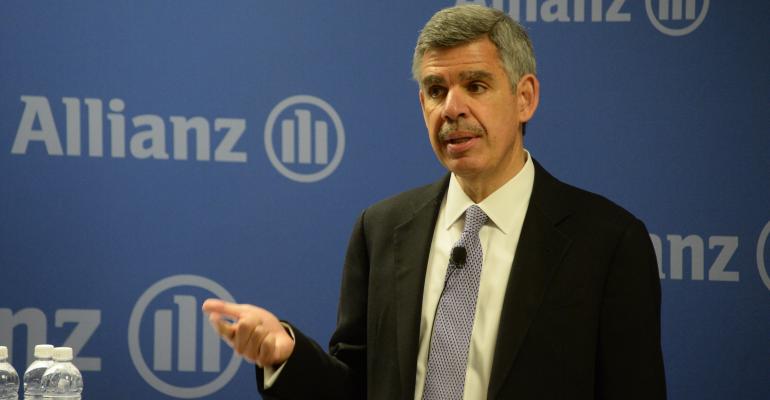Several years ago, most people would’ve thought these events were pretty unlikely: a Brexit referendum, the Fed being accused of being inconsistent, negative nominal interest rates and strange politics. But these “improbables and unthinkables” are now reality, and they are signs that the road we’re on is coming to an end in the next two to three years, Mohamed El-Erian, chief economic adviser at Allianz, told reporters at a media event Monday morning. To survive, long-term investors ought to throw out conventional wisdoms.
The long-term investor “has grown up with certain conventional wisdoms: You should be long-term focused; you shouldn’t be opportunistic. Diversification will do it all for you; it will produce high returns and mitigate risk. And cash doesn’t belong in a strategic asset allocation,” El-Erian said.
But those conventional wisdoms won’t hold up in the new environment we’re likely entering, he said. The current period of low growth, which is secular and structural, will likely become less stable.
“If you run a sophisticated market economy at low growth for a long time and if the benefits of that growth go to a small segment of the population, strange things start to happen, and we haven’t seen anything yet,” El-Erian said.
The global economy is no longer able to produce low and stable growth, and the central banks are finding it hard to repress financial volatility. These circumstances are leading to what he calls a ‘T-junction,’ where there are two very different outcomes for the global economy; we’re either on the cusp of things getting better or of something really bad happening.
“That is wide-open right now,” he said.
There are three reasons to be optimistic. The first is that most economists agree on what’s needed to get stable growth. That includes the need to restore genuine growth engines, such as infrastructure investing and corporate tax reforms, which we’ve not seen since the 1980s. Next, we need the rich to spend more. In the U.S., there’s been a dramatic worsening of income and wealth inequality, and the rich, in fact, spend less of their incremental income than the poor. And lastly, we need to complete regional and global architecture, particularly in Europe.
The second reason to be optimistic is that companies have a lot of cash on their balance sheets.
“So you don’t actually need a big bang in terms of policies,” El-Erian said. “You need a small bang in terms of policies, and then the private sector can do the heavy lifting.
“And three, there are some really exciting innovations going on that are in the process of going from being name-specific and sector-specific to having an economy-wide focus.”
But there are also reasons to believe the economy could go the other way: politics are really messy; the Bank of Japan is either ineffective or counterproductive, and it’s just a matter of time before other central banks become exhausted in what they’re trying to do. And, “financial assets have been so decoupled from fundamentals that when they start moving, they will move in a big way.”
All of these things have serious implications for asset management, and El-Erian warns long-term investors to change the way they invest. For one, if you had invested in the S&P 500 for the last two years, you would’ve earned nothing.
“However, we have gone through massive roller coasters the last two years, which suggests that you have to ask yourself, ‘Do I also need to be tactical as well as strategic in the way I invest?’” he said.
Also, because correlations are no longer behaving rationally, investors should no longer rely on them to mitigate risk.
And while investors traditionally have thought cash doesn’t belong in a strategic asset allocation, El-Erian says it should be part of a portfolio.
“Why? Because it gives you the three things you need to navigate a ‘T-junction.’”
Those three things include resilience, optionality—the ability to update your data set as you get more information—and agility.
“You need the ability to move quickly when you get conviction as to where this is going to end up.”

